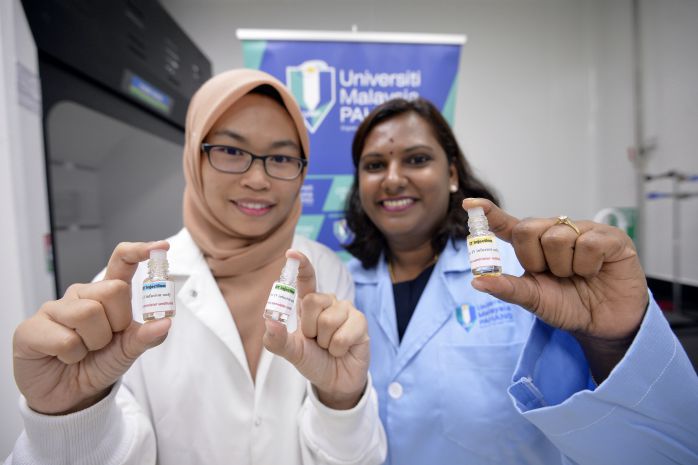UMP researchers produce antidandruff shampoo from herbal plant extracts

Kuantan, 28 August 2020 - Problems with itchy scalp, dandruff and hair loss are often experienced by some people regardless of whether they are men or women.
They are willing to spend more to buy various products available in the market but do not realise the effectiveness and side effects of the use of shampoos that contain harmful chemicals.
This problem has prompted the lecturer of the Faculty of Chemical and Process Engineering Technology (FTKKP), Dr. Rajaletchumy Veloo Kutty along with other researchers to produce shampoo from plant extracts that is safe to use.
This research was also assisted by the UMP students, namely Tanesha Thanaseelan, Nurul Isstiffaiyah Aminuddin and Wan Nur Suzilla Wan Yusoff.
According to Dr. Rajaletchumy, there are several antifungal shampoos in the market that use synthetic materials such as zinc pyrithione that bring side effects to the users.
“What we can see is the lack of awareness among the Malaysians to avoid the use of shampoos made from synthetic materials because they do not know the side effects of the materials.
“Therefore, that sparked the idea of research to produce antidandruff shampoo made from herbal plant extracts to solve this problem.
“This research commenced in March 2019 and was fully completed in December last year,” she said.
She added that antidandruff shampoo is a shampoo that is often used to treat dandruff.
“Most of the antidandruff shampoos available in the market are made from synthetic antidandruff agents, hard surfactants and ingredients that have the potential risk of side effects on long-term use,” she said.
“Also, the frequency of using shampoo can also cause hair loss, scalp dryness and itching.
“Therefore, this study produced antidandruff shampoo with medicinal plant extracts, light surfactants and used less synthetic ingredients,” she said.
She added that medicinal plant extracts used in the shampoo formulation will replace the function of synthetic antidandruff agents by inhibiting the growth of dandruff caused by Staphylococcus aureus and Malassezia restricta.
“Besides, the light surfactant that has replaced sodium lauryl sulfate will also clean the scalp efficiently and prevent further scalp dryness and itching.
“A plant extract was also added in this shampoo formulation to stimulate hair growth. Therefore, the problem of hair loss can be reduced.
“I am sure the quality of this antidandruff shampoo is on par with those available in the market without risking consumers because it is not produced from synthetic active ingredients and harmful chemicals in its formulation,” she said.
She added that it can overcome the problem of hair loss and is safe to use.
So far, the study conducted at FTKKP has not yet involved external agencies, and this project was funded via a UMP internal grant.
At the same time, she is trying to secure collaboration from external agencies that can contribute to the development and research of this formulation.
Also, Dr. Rajaletchumy hoped that the community will be more aware of the use of shampoo products in dealing with hair-related problems so that they can avoid adverse effects.
“I also hope that this product can benefit the community and can be marketed,” she said.
This product has won a gold medal and special award in the Creation, Innovation, Technology & Research Exposition (CITREx) 2020 organised by UMP on 12–13 February 2020.

